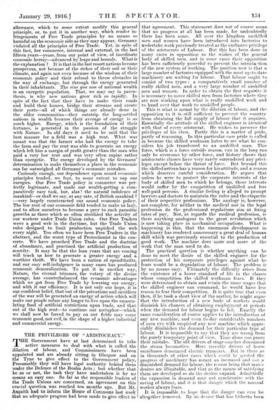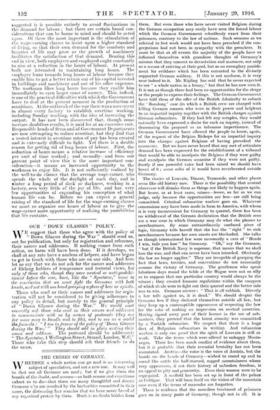THE PRIVILEGES OF "ARISTOCRACY."
THE Government have at last determined to take active measures to deal with what is called the dilution of labour, and Commissioners have been appointed and are already sitting in Glasgow and on the Tyne to give effect to the Government policy. Presumably they will have legal authority behind them under the Defence of the Realm Acts ; but whether that be so or not, the task they have undertaken is by no means an easy one. So far as the responsible .leaders of the Trade. Unions are concerned, an agreement . on this crucial question was reached ten months ago. But Mr. Asquith had to inform the House of Commons last week that no adequate progress had been made to give effect to that agreement. This statement does not of course mean that no progress at all has been made, for undoubtedly there has been some. All over the kingdom unskilled men and women have been introduced into factories to undertake work previously treated as the exclusive privilege of the, aristocrats of Labour. But this has been done in many eases in opposition to the wishes of the general body of skilled men, and in some cases their opposition has been sufficiently powerful to prevent the introdu-tion of the new system of working. The position now is that a large number of factories equipped with the most up-to-date machinery are waiting for labour. That labour ought to consist of two types : a comparatively small number of really skilled men, and a very large number of unskilled men and women. In order to obtain the first requisite it is necessary to move skilled men from factories where they are now working upon what is really unskilled work and to hand over that work to unskilled people.
This is what is meant by the dilution of labour, and the opposition to it is still sufficient to prevent the country from obtaining the full supply of labour that it requires. Essentially the attitude of the skilled engineer is identical with that of every aristocrat. He wishes to preserve the privileges of his class. Partly this is a matter of pride, partly of reasoning. In this particular case pride is called in because the skilled workman hates to see what he con- siders his job transferred to an unskilled man. This force, which is a force outside reason, can in the long run only be overcome by other force, and history shows that aristocratic classes have very rarely surrendered any privi- leges except before the threat of force. But beyond this the skilled artisan has a reason for his attitude, and a reason which deserves careful consideration. He argues that unless he were to protect the corporate interests of the body of skilled men to which he belongs, those interests would suffer by the competition of unskilled and less well-paid persons. A similar feeling is alleged to prompt lawyers and doctors to maintain the rules and the etiquette of their respective professions. The analogy is, however, not complete, for neither in the medical nor in the legal profession do the professional regulations aim at fixing rates of pay.. Nor, as regards the medical profession, is there anything analogous to the great revolution which is now taking place in mechanical occupations. What is happening is this, that the enormous development in machinery has rendered unnecessary a great deal of human skill which was previously essential to the production of good work. The machine does more and more of the work that the man used to do.
The practical question is whether anything can be done to meet the desire of the skilled engineer for the protection of his corporate privileges against what he fears would be a degradation of labour. The problem is by no means easy. Ultimately the difficulty arises from the existence of a lower standard of life in the classes whose competition the skilled workman fears. If they were determined to obtain and retain the same wages that the skilled engineer can command; he would have less reason to fear their competition. It is quite true that even then, if he took a short view of the matter, he might argue that the introduction of a new body of workers would diminish his chances of obtaining. employment at periods when the demand for labour begins to fail. Exactly the same consideration of course applies to the introduction of any new machine, and even to-day considerable numbers of men eye with suspicion any new machine which appre- ciably diminishes the demand for their particular type of labour. It is impossible to say that they are wrong from the purely temporary point of view. Time alone can prove their mistake. The old drivers of stage-coaches denounced the steam locomotive. More recently drivers of horse omnibuses denounced electric tramcars. But in these as in thousands of other cases which could be quoted the progress of machinery has meant an increased and not a diminished demand for labour, the reason being that man's desires are illimitable, and that as the means of satisfying them are developed so do the desires expand. Admittedly the expansion in demand may not synchronize with the saving of labour, and it is that {]anger which the manual worker always fears. It is impossible to hope that the danger can evex be altogether removed. By no device that has hitherto been suggested is it possible entirely to avoid fluctuations in the demand for labour ; but there are certain broad con- siderations that can be borne in mind and should be acted upon. Of these the most important is the stimulation of the wage-earning classes to insist upon a higher standard of living, so that their own demand for the comforts and luxuries of life may grow as the growth of machinery facilitates the satisfaction of that demand. Bearing this end in view, both employers and employed ought constantly to aim at a reduction in the hours of labour. At present both arc interested in maintaining long hours. The employer leans towards long hours of labour because they enable him to get a better return out of his capital invested in buildings and machinery and out of his office expenses. The workman likes long hours because they enable him immediately to earn larger sums of money. This, indeed, is one of the practical difficulties with which the Government have to deal at the present moment in the production of munitions. At the outbreak of the war there was a movement in almost every factory to establish overtime working, including Sunday working, with the idea of increasing the output. It has now been discovered that, though some increase doubtless results, it is paid for at an excessive cost. Responsible heads of firms and of Government Departments are now attempting to reduce overtime, but they find that a vested interest in overtime rates of pay has been created and is extremely difficult to fight. Yet there is a double reason for getting rid of long hours of labour. First, the reduction of hours means a relative increase of efficiency per unit of time worked ; and secondly--and from our present point of view this is the more important con- sideration—it means an increased opportunity to the workman to enjoy life. It is not sufficiently realized by the well-to-do classes that the average wage-earner, who spends the whole of the daylight of each day, and in winter a long period of dusk or darkness, working in a factory, sees very little of the joy of life, and has very few opportunities of expanding his conception of what human life can be. Before we can expect a general raising of the standard of life for the wage-earning classes we must so organize our hours of labour as to give the wage-earner more opportunity of realizing the possibilities that life contains.



















































 Previous page
Previous page